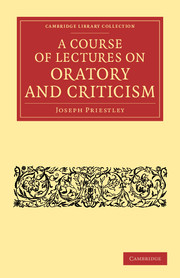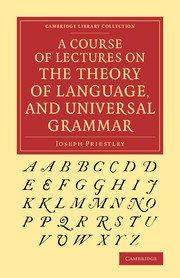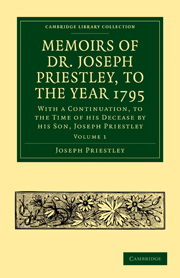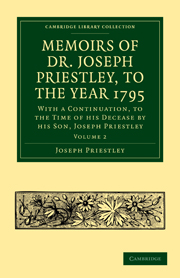A Course of Lectures on Oratory and Criticism
While a tutor at Warrington Academy, the polymath Joseph Priestley (1733–1804) established himself as a leading grammarian and educational theorist, producing the influential Rudiments of English Grammar (1761) and A Course of Lectures on the Theory of Language and Universal Grammar (1762), both of which are reissued in this series. In 1762 he also delivered these lectures on rhetorical theory, arguing that the purpose of rhetoric is moral formation. Priestley was deeply influenced by associationism, a theory of mind developed by John Locke and David Hartley. This claims that all complex ideas develop from simple ones, which arise purely from sensory impressions. The orator's role, then, is to form the right associations between impressions and ideas in a listener's mind. Informed by this theory, these thirty-five lectures re-evaluate the classical rhetorical components of topic, method and style. First published in 1777, the work is reissued here in its 1781 Dublin printing.
Product details
October 2013Paperback
9781108066075
396 pages
216 × 140 × 22 mm
0.5kg
Available
Table of Contents
- Dedication
- Preface
- Part I:
- 1. The introduction
- 2. Of the nature and use of topics
- 3. Of universal topics
- 4. Of particular topics
- 5. Of amplification
- Part II:
- 6. Of method in narrative discourses
- 7. Of method in argumentative discourses
- 8. Of the several parts of a proper demonstration
- 9. Of the analytical method
- 10. Of the method of Mr Hume's inquiry into the principles of morals, etc.
- Part III:
- 11. Of taste
- 12. What affects the passions, judgment, and imagination
- 13. Of the tendency of strong emotions to produce belief
- 14. Of the influence of the passions on each other
- 15. Of forms of address adapted to gain belief
- 16. Of objections, etc.
- 17. Of the pleasures of imagination
- 18. A general account of the pleasure we receive from objects
- 19. Of novelty
- 20. Of the sublime
- 21. Of the pleasure we receive from uniformity, and variety
- 22. Of the nature of metaphors
- 23. Rules for the use of metaphors
- 24. Of contrast
- 25. Of burlesque etc.
- 26. Of riddles, puns, etc.
- 27. Of metoymy
- 28. Of the hyperbole and bombast
- 29. Of personification
- 30. Of imitation
- 31. Of climax
- 32. Of perspicuity in style
- 33. Of the resemblance between sound and sense
- 34. Of harmony in verse
- 35. Of harmony in prose.





